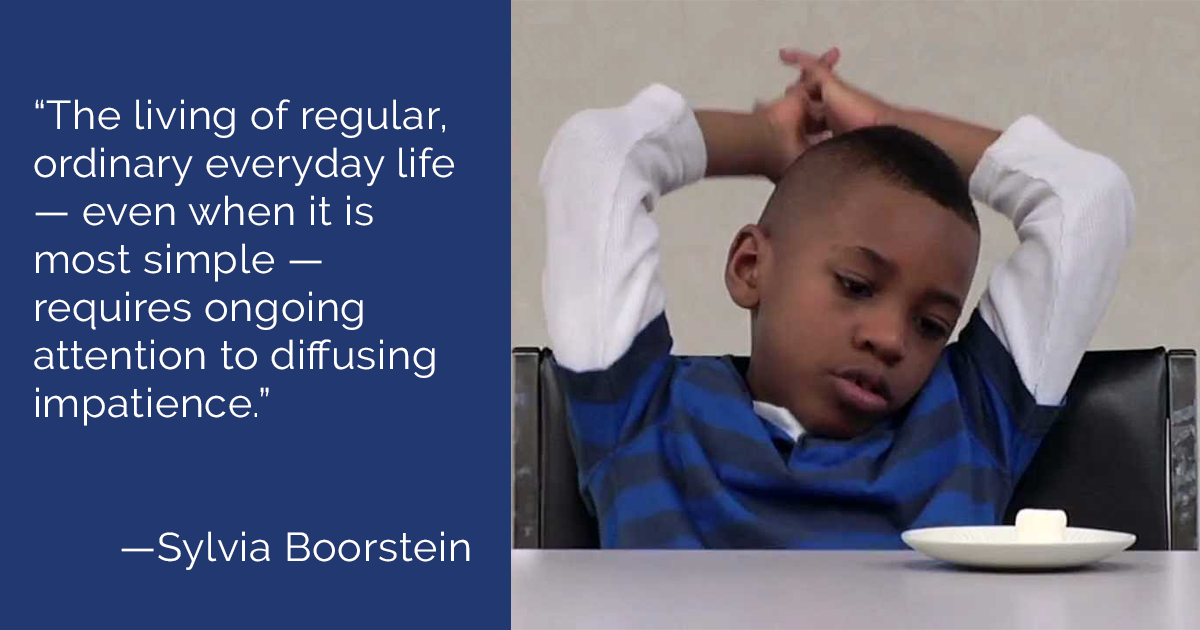Imagine you are a four-year-old and a man places a marshmallow on a plate in front of you. He tells you that if you wait 15 minutes before eating that marshmallow you will be given one more. The man leaves and there you are, alone, with that marshmallow and 15 minutes of time. What do you do?
If you waited 15 minutes not only did you get to eat two marshmallows, later in life you were more successful in multiple measures (education, competence, health, etc.) according to the follow-up studies to the Stanford marshmallow experiments, a series of studies on delayed gratification.
Imagine you are leading a project at work and a colleague, let’s call him David, is not getting done what you want him to get done when you want him to do it. Do you get impatient and pound out an email with attitude? The angry email might not lead to your getting you what you want and it might damage your relationship with David.
Or, do you wait 15 minutes (or even 15 seconds) and reflect on what might be happening. Does David understand what you want him to do and when? Did he agree to the task and time frame? Is there some understandable reason for the delay? What is it that is making you impatient or angry? Is he threatening your authority as a leader or the success of the project? Or, is he simply preventing you checking things off your “To Do” list and interfering with things going the way you want them to go?
Waiting seems to be an anathema to most everyone. In a world in which an essential marketing strategy for internet service providers is speed, patience has become an undervalued virtue. Diffusing impatience requires ongoing attention in everyday life at work and home. Patience is an important antidote to anger, an emotion that is more destructive than any other. Patience makes you a more effective leader and colleague because it allows time for you to consider how to respond and avoid turning any situation into a difficult or destructive one.
Patience is not doing nothing. It is allowing life to unfold and looking for a perspective that can help transform the moment of impatience into one in which you see more clearly and act constructively; for example, checking whether David’s understanding of the task’s due date is the same as yours. You could think of patience as a kind of unglamorous courage: a willingness to stay with your impatience long enough to understand and diffuse it.
You can develop more patience with practice. One of my favorites places to practice is waiting in line in a market or sitting in traffic. I look for a perspective that will help me transform the moment. For example, standing in line, I take a breath and feel grateful for being alive. Gratitude is a terrific impatience diffuser. Or, in traffic, I remind myself that this will change at some point, as all situations do; but, for the moment, it simply is what it is. Patience and calm are possible in any moment, regardless of the circumstances. I also tell myself that impatience is not healthy because it can trigger the release of above normal amounts of cortisol (the stress hormone) into my system.
So, if you are impatient with your version of David today, think of him as a marshmallow, and wait at least 15 minutes before you send an email, call, or go to his work area. Instead of getting impatient, you might want to check in on how things are going for him, what he might need and when he anticipates getting the task done or when he thinks it is due.
* Thank you to Roger James for his contributions to this piece.
Mary’s award-winning book “Talk Matters! Saving the World One Word at a Time” is now available. Click here to purchase it.


Thanks for this. My biggest problem with patience is being patient with myself. You gave some examples of where you practice. I think I might try using mindfulness when I find myself becoming impatient with self or others.
Thanks, Ashton. I see myself in your comment. I think patience with me is related to how patient I am with others. I am more patient with others when I am being patient with me!